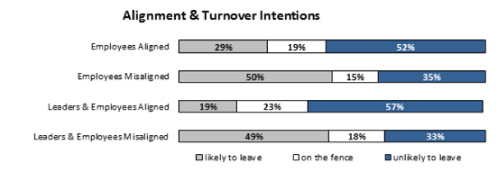Study: Culture Important by Measured by Few
Companies that measure corporate culture have more engaged and committed employees, according to the results of a study from Critical Metrics, LLC. The findings also revealed that although most employees and senior leaders think that measuring corporate culture is important, few companies measure it, and even fewer do it well.
Forty-six per cent of the 236 management and human resources professionals from U.S.-based companies who participated in the study said that their company measures culture. In those companies that measured culture, only 57 per cent of employees thought their leadership team did a good job of doing so.
The findings also highlighted the benefits of measuring culture. Companies that measured culture have employees who understood the culture and were aligned in their view of that culture. Both, cultural understanding and alignment, are linked to important business outcomes.
When employees were aligned in their view of culture, good things were happening. Of those employees who thought that their views of culture were similar to the views of leadership, 85 per cent reported being committed to the organization (compared to 48 per cent of those who perceived misalignment) and 87 per cent reported being satisfied with the organization (compared to 33 per cent of those who perceived misalignment). When employees report cultural alignment, they are less likely to leave.

Similarly good things were happening in organizations where employees understood organizational culture. Employees who understood organizational culture were more committed to and satisfied with the organization, were less likely to leave in the next year, and were also more likely to recommend the organization as a great place to work.
If measuring culture is beneficial, why doesn’t everyone do it?
The most common reasons companies did not measure culture had to do with not seeing the need to do so. Twenty-two per cent of participants thought that their company did not need to measure culture. Another twenty per cent of participants said that the leadership of their company did not think it was important to measure culture or that it was not a priority. Other responses included “We don’t know how to do that” or “We hadn’t thought of it before.” Only a few participants talked about such reasons as lack of resources or people.
“It seems that companies are paying lip service to culture,” said David Youssefnia, president, Critical Metrics. “Everyone talks about how important culture is, and the results of our study show us the great benefits of measuring culture and having an aligned culture. Yet, few actually dedicate time to measuring and understanding their culture.
Those companies that do focus on culture (think Southwest Airlines and Zappos.com) continue to benefit from having strong cultures with increased customer loyalty and stronger internal and external brands. But before culture can become a competitive advantage for your company, it needs to be understood and reinforced within your organization, and culture measurement is the first step in this process.
Clearly culture matters. Culture is becoming one of the most powerful competitive differentiators for recruiting and retaining talent and building a strong internal and external brand.”
Critical Metrics, LLC, a Seattle-based consulting firm, that helps clients understand what drives employee and customer success. For additional information, including additional survey findings, please contact David Youssefnia, Ph.D., president of Critical Metrics, LLC via email david@critical-metrics.com or telephone 206 436 3470.









